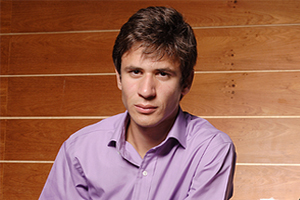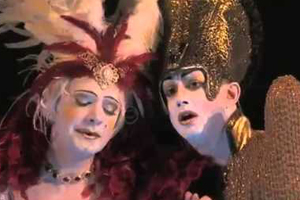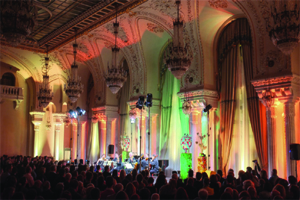
Cristian Budu, the winner of the Clara Haskil Competition
Cristian Budu, winner of the Clara Haskil International Competition in Switzerland (2013), gave an interview to our magazine. You can listen to him playing in the opening of the Clara Haskil International Festival in Sibiu.
Before winning the Clara Haskil Competition, not many people knew about you here, in Romania. After this event, your name suddenly appeared in all important publications, as the Romanian-born Brazilian pianist who won the big prize. Therefore, what can you tell us about yourself and your family?
I think what I can tell about my story that is interesting, is that I grew up in a dualistic environment. At home, my family kept Romanian traditions and the mentality was “European”. Outside the house, I was living in one of the craziest suburbs of São Paulo. Of course I feel I’m Brazilian, but I always had the intimate connection with Romania through my parents, speaking the language and hearing about my ancestors.
My parents came to Brazil in 1981, basically with nothing, and I’m very grateful for all the help they gave me and the values they carried on. They cared much more about what I cultivated inside me, that no one can steal.
Does music run in the family?
Music was always part of our home. My parents used to arrange pieces so that my siblings and I would play chamber music with them, and this always made me so happy. This natural connection with music was extremely important.
In your recitals you often play pieces signed by Heitor Villa-Lobos. Is he as important for Brazil as Enescu is for Romania? What is the hardest thing about playing his music?
Yes, Villa-Lobos is a very important composer for us, mainly because he widely brought elements of folk music into his compositions.
The hardest thing about playing his music is to make it convincing all the way through. This happens because he did not care enough about the final editing in his works, and sometimes the form of his pieces (isolated parts, of course) lack some kind of coherence, even with very inspired materials.
Guiomar Novaes and Nelson Freire are the most renowned Brazilian pianists of the century. Does Brazil have a piano school to continue Noaves’ tradition?
Unfortunately, Brazil doesn’t hold on traditions easily. This happens because there is a lack in the structure of our schools and people have a very “short-term” memory. So even though Guiomar Novaes should represent so much in Brazil, there is not even a school to continue her work. Nelson Freire is trying to do it, I would say. But we miss having something more consistent. And surprisingly, not all the pianists in Brazil even know about her that well.
The Clara Haskil Competition is known for its desire to promote not only virtuosi musicians, but more importantly pianists that want to keep alive the memory of Clara Haskil, her art, her sensitivity, her touch, etc. Can we talk about two types of piano competitions: those in which virtuosity is emphasized and those which focus on the classic repertoir, including also Schubert and Schumann?
Well, I think Clara Haskil is a special competition, perpetuating the values that are present in Clara Haskil’s approach to music, because it’s really rare to find music institutions that care about these things – as priorities.
Generally, I think it’s not really about the composers themselves (of course, those ones give emphasis to the lyrical side of music), but it’s really a matter of believing that music always brings an expressive and unique meaning, and not the things around it – mechanical or visual effects. The goal should also be what music was at the beginning – understanding it and allowing it to reach the deepest part of our souls.
Can young pianists nowardays built an international career? Lately, Asian virtuosity has been extremely present on the large scenes of the world, promoting their own stars (such as Lang Lang) who record albums every year. Do you think this is just a trend? Do you believe virtuosity is enough for a pianist?
Well, for the public who doesn’t play the piano, and even for those who play it, it’s always impressive to see people being able to move their fingers very fast. Of course, I’m not trying to judge anyone in a bad way. To play some pieces you need to make your fingers move quickly. But I think your only concern in that case is to focus on “the fingers” and not on “what makes them move”.
So what I think is that the repertoire and the technique of mastering an instrument became “vicious”. People expect to see what they already know and don’t allow themselves to live the real music experience, which is subjective and therefore infinitely diverse. I miss those times when I was not born yet and when each musician had a very distinctive interpretation.
As for the chances of having international careers, it all depends on what people want to see, but also what they see is what the managers sell. It is a tricky market. There are a lot of hidden musicians who don’t “agree” with the general music “market” and isolate themselves.
When we talk about international careers, does marketing matter more than art or is it still the other way around?
Continuing in the same line, I think it’s both, but in the end, if people want to listen to you and if you sell tickets, then naturally you have a career. Many people go to a concert to hear great names, just because they are great (and don’t care about the artistic part, even if that musician is actually incredible).
I would say one needs to like your art first – and there is a natural subjective judgement there. Some people will like you, some people won’t. But once an important person likes you, if you get famous (because of the marketing), then suddenly a lot of people start to like you.
What were the immediate reactions after your success at the Clara Haskil Competition? Were you invited to perform in many concerts and recitals?
Yes, I had many concerts, which is nice. But I didn’t feel comfortable right at the beginning of that period, because I was not used to it. Now I feel I’m more ready. It’s tricky because being “in the market” you have to deal with the business part of it, and music has nothing to do with this. So it was important for me to find the balance.
What are your near future projects?
Well, to keep playing! And I’m also developing a project in Brazil named Pianosofia, which brings chamber music in the houses of people that have pianos which are usually not played. I always felt that people should feel more intimate with classical music first of all, and I’m not talking only about the public but also about the musicians!
Can we even hope to enjoy a record any time soon?
Yes, I have just recorded in Switzerland this year, for Claves Records, a CD with Chopin 24 Preludes and Beethoven Bagatelles op. 33. I’ve recorded one in Brazil too, but it one won’t probably arrive in Europe.
Is there any pianist or piece that, at least at some point, you couldn’t have enough of?
Yes! Well, I love Dinu Lipatti’s playing, Arthur Schnabel’s, Alfred Brendel’s, Radu Lupu’s, Géza Anda’s, Guiomar Novaes’s, Sviatoslav Richter’s.
I’ve been obsessed with Russell Sherman lately, this genius pianist from USA, who lives in Boston and is 85 years old. I am lucky to take some lessons with him from time to time.









